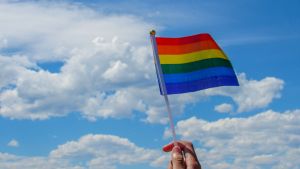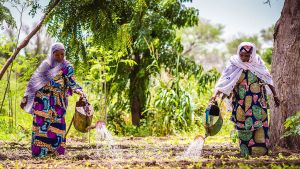The Unholy Relationship Between Uganda's Anti-LGBTQ+ Law and US Evangelicalism

American religious groups have spent millions exporting homophobia to the East African nation.
On May 29, Ugandan President Yoweri Museveni signed a new anti-gay law that puts the country’s already persecuted LGBTQ+ community at risk of life imprisonment for same-sex relations and calls for the death penalty for “aggravated homosexuality.” This draconian legislation is the latest blow to fundamental human rights in Uganda, and it has deep links to American evangelicals who have for years sought to export US culture wars over gender and sexuality to African countries and Uganda in particular.
Exporting US Culture Wars
When the US government began legalizing gay marriage at the state level in the early 2000s, many extreme evangelical groups started to recognize that the fight against LGBTQ+ rights in the United States was a losing battle. These groups then shifted focus to Uganda, which was seen as fertile ground for this anti-gay ideology due to a majority conservative Christian base and young population. Uganda had also been significantly impacted by HIV/AIDS in the 1990s and was still recovering from a devastating civil war in the 1980s.
American evangelical groups have since spent years and tens of millions of dollars spreading homophobia in Uganda and beyond. Data from OpenDemocracy shows that from 2007 to 2020, over 20 US evangelical groups spent at least $54 million in Africa “to influence laws, policies, and public opinion against sexual and reproductive rights." Nearly half of that figure was spent in Uganda.
This movement quickly gained traction in 2009 after top American evangelical leaders headlined a three-day conference in Kampala on “exposing the homosexuals’ agenda.” Speakers promoted the notion that the “traditional” Ugandan family is exclusively heterosexual, claiming that gay Westerners and activists are attempting to spread homosexuality by corrupting and recruiting children around the world. Attendees and top politicians, including President Museveni and his wife, received this message well.
Shortly after the 2009 seminar, Ugandan official David Bahati wrote the first version of the Anti-Homosexuality Act, which was eventually passed in 2014. This outraged international activist groups and led some governments, including the United States, to withhold aid to Uganda. The White House also imposed targeted sanctions against Ugandans involved in human rights abuses against gay people, cut funds to various programs (including those that helped fund the Ugandan Police Force), and canceled a joint military exercise. In part due to this pressure, the 2014 Anti-Homosexuality Act was ruled invalid in Uganda’s constitutional court.
Neocolonialism Rebranded
Nevertheless, anti-gay sentiments are still widely held in Ugandan society. The evangelical campaign has effectively portrayed homophobia as opposition to neocolonialism, even though the anti-gay message itself is pushed by foreign interests.
In reality, many pre-colonial African belief systems tolerated homosexuality and, in some cases, incorporated those from the LGBTQ+ community into society with named roles and sexual identities. Historical texts suggest that this was the case among several different Ugandan ethnic groups, including the Langi, Iteso, Baganda, Bahima, and Banyoro. And although homophobia was present in Uganda before the evangelical effort took off in the 2000s, those sentiments are rooted in 19th and 20th-century colonial efforts to erase Africa’s history of sexual diversity.
In fact, research shows that former British colonies are far more likely to have laws that criminalize homosexuality than other nations, including former colonies of other European states. This is true for Uganda in particular, as the present-day laws against LGBTQ+ rights are directly tied to British colonial laws that punished “carnal knowledge against the order of nature.”
The Impact of Uganda’s Anti-Gay Act
Unfortunately, American evangelical groups continue to influence Ugandan politics and culture. In April, the Arizona-based hate group Family Watch International co-sponsored an inter-parliamentary conference on “family values and sovereignty,” just weeks after 444 of Uganda’s 557 parliamentarians voted in favor of the anti-gay bill. Family Watch International has also been coaching high-ranking Ugandan politicians and religious leaders for years to support their extreme and oppressive positions on gender and sexual diversity.
The Anti-Homosexuality Act has profound implications for Ugandan society and provides a stronger legal basis for homophobia. Since the bill was passed in parliament, members of the LGBTQ+ community have been forced to flee neighboring countries in fear for their safety.
Moreover, the legislation prohibits the “promotion” of homosexuality, which could potentially put US-funded health programs that support LGBTQ+ people at risk of criminal liability. US President Joe Biden has directed the National Security Council to “evaluate the implications of this law on all aspects of US engagement with Uganda, including our ability to safely deliver services under the US President’s Emergency Plan for AIDS Relief (PEPFAR).” This could jeopardize Uganda’s progress towards ending AIDS as a public health crisis by 2030.
While the Biden administration has threatened sanctions and restriction of entry into the United States against those involved with the legislation, it has not mentioned plans to evaluate its security assistance to Uganda. Museveni’s government has been one of the top recipients of US military assistance in Africa, which includes training, logistics, equipment, and advisory support for its regional operations. Withholding funds and training that benefit Uganda’s security apparatus could be a persuasive tool, as it was in 2014.
Although the White House has tools to pressure the Ugandan government, it could prove more challenging to address the issue of US evangelical influence.


Related Content
 Global Cities
Global Cities
Around the world, cities continue to protect the basic human rights of vulnerable populations in the face of fierce opposition from national governments.
 Inclusion and Equity
Inclusion and Equity
Although data shows South Koreans remain uncomfortable with homosexuality, recent trends show an increase in acceptance.
 Climate and the Environment
Climate and the Environment
Unclean water, poor sanitation, and lousy hygiene—and resulting diseases—combine with poor nutrition as the leading causes of young child mortality and stunting.
